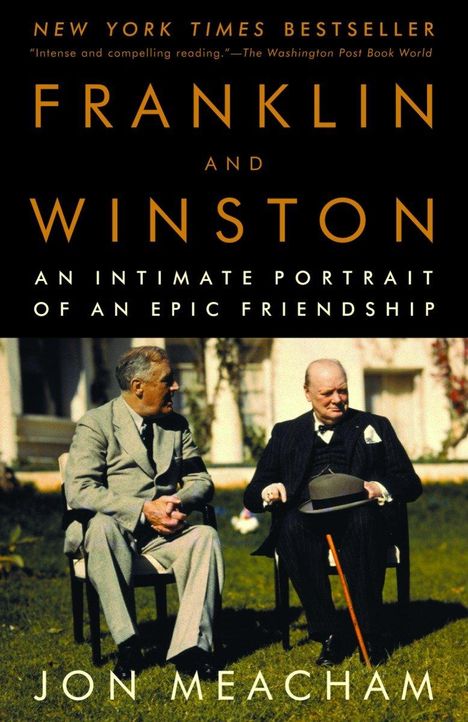Jon Meacham: Franklin and Winston, Kartoniert / Broschiert
Franklin and Winston
- An Intimate Portrait of an Epic Friendship
(soweit verfügbar beim Lieferanten)
- Verlag:
- Random House Publishing Group, 10/2004
- Einband:
- Kartoniert / Broschiert
- Sprache:
- Englisch
- ISBN-13:
- 9780812972825
- Artikelnummer:
- 6087323
- Umfang:
- 514 Seiten
- Copyright-Jahr:
- 2004
- Gewicht:
- 367 g
- Maße:
- 204 x 133 mm
- Stärke:
- 27 mm
- Erscheinungstermin:
- 12.10.2004
- Hinweis
-
Achtung: Artikel ist nicht in deutscher Sprache!
Klappentext
NEW YORK TIMES BESTSELLER • In this "beautifully written and superbly researched dual biography" (Los Angeles Times Book Review ), Pulitzer Prize--winning biographer Jon Meacham "paints a powerful portrait of the enormous friendship between World War II allies [Franklin] Roosevelt and [Winston] Churchill" (Vanity Fair).
"Intense and compelling reading."---The Washington Post
Franklin Roosevelt and Winston Churchill were the greatest leaders of "the Greatest Generation." In Franklin and Winston, Jon Meacham explores the fascinating relationship between the two men who piloted the free world to victory in World War II.
Born in the nineteenth century and molders of the twentieth and twenty-first, Roosevelt and Churchill had much in common. In their own time both men were underestimated, dismissed as arrogant, and faced skeptics in their own nations---yet both magnificently rose to the central challenges of the twentieth century. Theirs was a kind of love story, with an emotional Churchill courting an elusive Roosevelt. The British prime minister, who rallied his nation in its darkest hour, standing alone against Adolf Hitler, was always somewhat insecure about his place in FDR's affections---which was the way Roosevelt wanted it. A man of secrets, FDR liked to keep people off balance, including his wife, Eleanor, his White House aides---and Winston Churchill.
Meacham's sources---including unpublished letters of FDR' s great secret love, Lucy Mercer Rutherfurd, the papers of Pamela Churchill Harriman, and interviews with people who were in FDR and Churchill's joint company---shed light on the characters of both men as he engagingly chronicles the hours in which they decided the course of the struggle.
Charting the personal drama behind the discussions of strategy and statecraft, Meacham has written the definitive account of the most remarkable friendship of the modern age.



